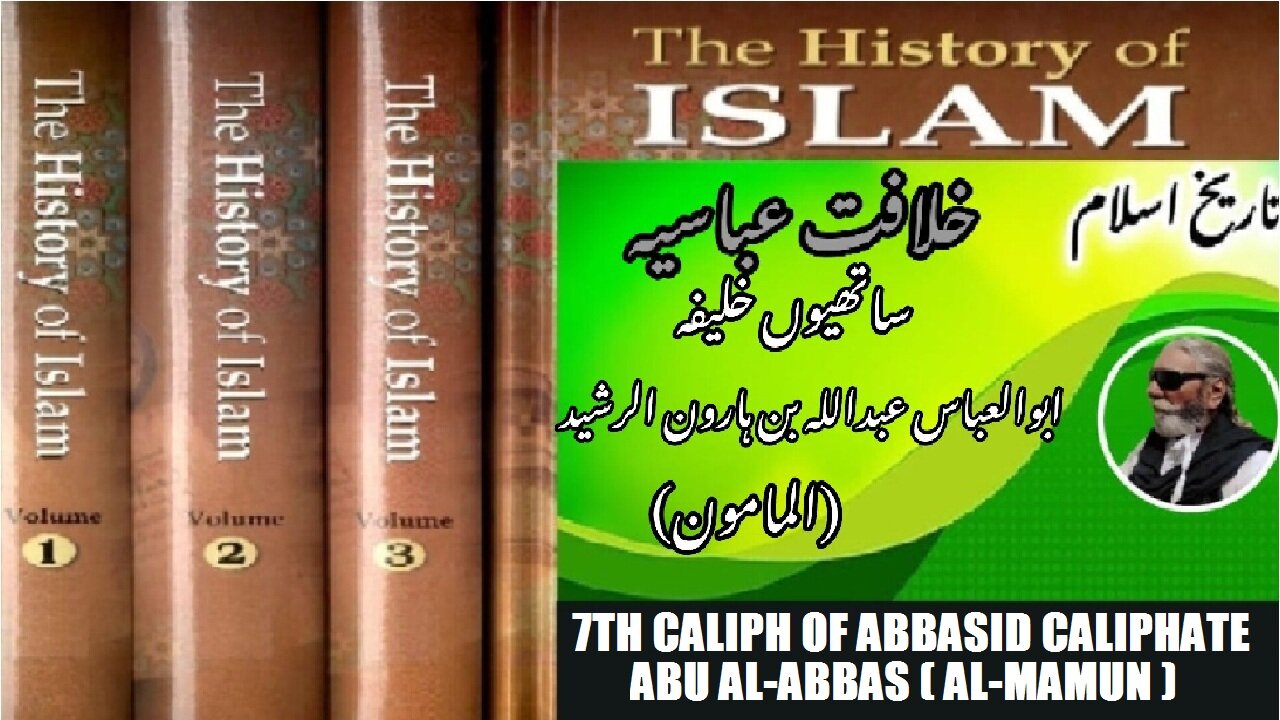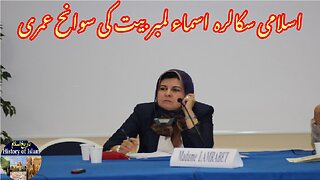Premium Only Content

7th Caliph of Abbasid Caliphate Abu al-Abbas Abd Allah ibn Harun al-Rashid (al-Mamun)
@islamichistory813 #abbasidcaliphate #sixthcaliph #almamun
Seventh Caliph of Abbasid Caliphate Abu al-Abbas Abd Allah ibn Harun al-Rashid (al-Mamun)
Asslamoalaikum sisters brothers friends and elders, today we are discribing the fascinating history of Abu al-Abbas Abd Allah ibn Harun al-Rashid, better known as Al-Mamun, the Seventh Caliph of the Abbasid Caliphate. This video explores his reign, contributions, and the pivotal role he played in ushering in an era of scientific, cultural, and intellectual advancements during the Islamic Golden Age.
By the end of this video, you'll gain a deeper understanding of Al-Mamun's efforts in promoting knowledge, his patronage of scholars, and the establishment of the House of Wisdom in Baghdad.
Don't forget to Share this educational journey to spread the knowledge!
Abu al-Abbas Abd Allah ibn Harun al-Rashid better known by his regnal name al-Ma'mun was the seventh Abbasid caliph, who reigned from 813 until his death in 833. He succeeded his half-brother al-Amin after a civil war, during which the cohesion of the Abbasid Caliphate was weakened by rebellions and the rise of local strongmen; much of his domestic reign was consumed in pacification campaigns. Well educated and with a considerable interest in scholarship, al-Ma'mun promoted the Translation Movement, the flowering of learning and the sciences in Baghdad, and the publishing of al-Khwarizmi's book now known as "Algebra". He is also known for supporting the doctrine of Mu'tazilism and for imprisoning Imam Ahmad ibn Hanbal, the rise of religious persecution (mihna), and for the resumption of large-scale warfare with the Byzantine Empire
Abdallah, the future al-Ma'mun, was born in Baghdad on the night of the 13 to 14 September 786 CE to Harun al-Rashid and his concubine Marajil, from Badghis. On the same night, which later became known as the "night of the three caliphs", his uncle al-Hadi died and was succeeded by Ma'mun's father, Harun al-Rashid, as ruler of the Abbasid Caliphate.[1] Marajil died soon after his birth, and Abdallah was raised by Harun al-Rashid's wife, Zubayda, herself of high Abbasid lineage as the granddaughter of Caliph al-Mansur (r.?754–775).[2] As a young prince, Abdallah received a thorough education: al-Kisa'i tutored him in classical Arabic, Abu Muhammad al-Yazidi in adab, and he received instruction in music and poetry. He was trained in fiqh by al-Hasan al-Lu'lu'i, showing particular excellence in the Hanafi school, and in the hadith, becoming himself active as a transmitter.[2] According to M. Rekaya, "he was distinguished by his love of knowledge, making him the most intellectual caliph of the Abbasid family, which accounts for the way in which his caliphate developed".[2]
Appointment as successor and Governor of Khurasan
Although Abdallah was the oldest of his sons, in 794 Harun named the second-born Muhammad, born in April 787 to Zubayda, as the first in line of succession. This was the result of family pressure on the Caliph, reflecting Muhammad's higher birth, as both parents descended from the Abbasid dynasty; indeed, he remained the only Abbasid caliph to claim such descent. Muhammad received the oath of allegiance (bay'ah) with the name of al-Amin ("The Trustworthy"), first in Khurasan by his guardian, the Barmakid al-Fadl ibn Yahya, and then in Baghdad.[2] Abdallah was recognized as second heir only after entering puberty, in 799, under the name al-Ma'mun ("The Trusted One"), with another Barmakid, Ja'far ibn Yahya, as his guardian. At the same time, a third heir, al-Qasim, named al-Mu'tamin, was appointed, under the guardianship of Abd al-Malik ibn Salih.[2]
These arrangements were confirmed and publicly proclaimed in 802, when Harun and the most powerful officials of the Abbasid government made the pilgrimage to Mecca. Al-Amin would succeed Harun in Baghdad, but al-Ma'mun would remain al-Amin's heir and would additionally rule over an enlarged Khurasan.[2] This was an appointment of particular significance, as Khurasan had been the starting point of the Abbasid Revolution which brought the Abbasids to power, and retained a privileged position among the Caliphate's provinces. Furthermore, the Abbasid dynasty relied heavily on Khurasanis as military leaders and administrators. Many of the original Khurasani Arab army (Khurasaniyya) that came west with the Abbasids were given estates in Iraq and the new Abbasid capital, Baghdad, and became an elite group known as the abn?? al-dawla ("sons of the state/dynasty").[3][4] This large-scale presence of an Iranian element in the highest circles of the Abbasid state, with the Barmakid family as its most notable representatives, was certainly a factor in the appointment of al-Ma'mun, linked through his mother with the eastern Iranian provinces, as heir and governor of Khurasan.[5] The stipulations of the agreement, which were recorded in detail by the historian al-Tabari, accorded al-Mamun's Khurasani viceroyalty extensive autonomy. However, modern historians consider that these accounts may have been distorted by later apologists of al-Ma'mun in the latter's favour.[6] Harun's third heir, al-Mu'tamin, received responsibility over the frontier areas with the Byzantine Empire in Upper Mesopotamia and Syria.[2][7]
Very quickly, the latent rivalry between the two brothers had important repercussions: almost immediately after the court returned to Baghdad in January 803, the Abbasid elites were shaken by the abrupt fall of the Barmakid family from power. On the one hand, this event may reflect the fact that the Barmakids had become indeed too powerful for the Caliph's liking, but its timing suggests that it was tied to the succession issue as well: with al-Amin siding with the abn?? and al-Ma'mun with the Barmakids, and the two camps becoming more estranged every day, if al-Amin was to have a chance to succeed, the power of the Barmakids had to be broken.[2][8][9]
Al-Fadl ibn Sahl, a Kufan of Iranian origin whose father had converted to Islam and entered Barmakid service, replaced Ja'far ibn Yahya as al-Ma'mun's tutor. In 806 he also became al-Ma'mun's secretary (katib), an appointment that marked him out as the chief candidate for the vizierate should al-Ma'mun succeed to the throne.[2] In 804, al-Ma'mun married his cousin, Umm Isa, a daughter of the Caliph al-Hadi (r.?785–786). The couple had two sons, Muhammad al-Asghar and Abdallah.[2]
The years after the fall of the Barmakids saw an increasing centralization of the administration and the concomitant rise of the influence of the abn??, many of whom were now dispatched to take up positions as provincial governors and bring these provinces under closer control from Baghdad.[9] This led to unrest in the provinces, especially Khurasan, where local elites had a long-standing rivalry with the aabn?? and their tendency to control the province (and its revenues) from Iraq.[10] The harsh taxation imposed by a prominent member of the abn??, Ali ibn Isa ibn Mahan, even led to a revolt under Rafi ibn al-Layth, which eventually forced Harun himself, accompanied by al-Ma'mun and the powerful chamberlain (hajib) and chief minister al-Fadl ibn al-Rabi, to travel to the province in 808. Al-Ma'mun was sent ahead with part of the army to Merv, while Harun stayed at Tus, where he died on 24 March 809
Al-Ma'mun's first wife was Umm Isa, a daughter of his uncle al-Hadi (r.?785–786),[2] whom he married in 804,[28] when he was eighteen years old. They had two sons, Muhammad al-Asghar, and Abdallah.[2] Another wife was Buran, the daughter of al-Ma'mun's vizier, al-Hasan ibn Sahl.[29] She was born as Khadija[29] on 6 December 807.[30] Al-Ma'mun married her in 817, and consummated the marriage with her in December 825–January 826 in the town of Fam al-Silh.[29] She died on 21 September 884.[30]
Al-Ma'mun had also numerous concubines.[2] One of them, Sundus, bore him five sons, among whom was al-Abbas, who rose to become a senior military commander at the end of al-Ma'mun's reign and a contender for the throne.[31] Her other sons were Harun, Ahmad, Isa and Isma'il.[32] Another concubine was Arib.[33] Born in 797,[34] she claimed to be the daughter of Ja'far ibn Yahya, the Barmakid, stolen and sold as a child when the Barmakids fell from power. She was brought by al-Amin, who then sold her to his brother.[33] She was a noted poet, singer, and musician.[33] She died at Samarra in July–August 890, aged ninety-three.[34] Another concubine was Bi'dah, known by her epithet al-Kabirah. She was also a singer, and had been a slave of Arib.[35] She died on 10 July 915. Abu Bakr, the son of Caliph al-Muhtadi, led the funeral prayers.[36] Another concubine was Mu'nisah, a Greek.[37] She was one of his favourites.[38] Another concubine was Tatrif, also known as Tazayyuf. She was an accomplished poet and a native of Basra. She was noted for beauty and elegance, and it was said that al-Ma'mun favoured her above all his other concubines. She was inconsolable at his death and mourned him in many poems.[39] Another concubine was Badhal. She had been formerly a concubine of his cousin Ja'far bin al-Hadi, his brother al-Amin and Ali bin Hisham. She hailed from Medina and was raised in Basra. Described as charming with fair skin, she was praised for her musical talent, particularly her skill in playing instruments, and was known for her exceptional ability as a songwriter and singer. After al-Ma'mun's death, his brother al-Mu'tasim married her.[39] Another concubine was Nu'n. She was a singer.[40] Another concubine was Nasim. She was a poetess and was one of his favourites.[41]
Al-Ma'mun had another son named Musa.[28] He had three daughters. One was Umm Habib, who married Ali ibn Musa al-Rida. Another daughter was Umm al-Fadl, who married Muhammad ibn Ali bin Musa[42] in 818.[28] Another daughter Khadija was a poetess.[39]
Death and legacy
Al-Tabari recounts how al-Ma'mun was sitting on the river bank telling those with him how splendid the water was. He asked what would go best with this water and was told a specific kind of fresh dates. Noticing supplies arriving, he asked someone to check whether such dates were included. As they were, he invited those with him to enjoy the water with these dates. All who did this fell ill. Others recovered, but al-Ma'mun died. He encouraged his successor to continue his policies and not burden the people with more than they could bear. This was on 9 August 833.[43]
Al-Ma'mun died near Tarsus. The city's major mosque (Tarsus Grand Mosque), contains a tomb reported to be his. Al-Ma'mun had made no official provisions for his succession. His son, al-Abbas, was old enough to rule and had acquired experience of command in the border wars with the Byzantines, but had not been named heir.[44] According to the account of al-Tabari, on his deathbed al-Ma'mun dictated a letter nominating his brother, rather than al-Abbas, as his successor,[45] and Abu Ishaq was acclaimed as caliph on 9 August, with the Laqab of al-Mu'tasim (in full al-Mu?ta?im bi’ll?h, "he who seeks refuge in God").[46] It is impossible to know whether this reflects actual events, or whether the letter was an invention and Abu Ishaq merely took advantage of his proximity to his dying brother, and al-Abbas's absence, to propel himself to the throne. As Abu Ishaq was the forefather of all subsequent Abbasid caliphs, later historians had little desire to question the legitimacy of his accession, but it is clear that his position was far from secure: a large part of the army favoured al-Abbas, and a delegation of soldiers even went to him and tried to proclaim him as the new Caliph. Only when al-Abbas refused them, whether out of weakness or out of a desire to avoid a civil war, and himself took the oath of allegiance to his uncle, did the soldiers acquiesce in al-Mu'tasim's succession
Almanon, a lunar impact crater that lies in the rugged highlands in the south-central region of the Moon, was named after al-Ma'mun.[49]
Al-Ma'mun was the last Abbasid caliph who had a one-word Laqab, his successors had laqab with suffixes like Billah or al? All?h.
His nephew, Harun (future al-Wathiq) learned calligraphy, recitation and literature from his uncle, Caliph al-Ma'mun.[50] Later sources nickname him the "Little Ma'mun" on account of his erudition and moral character
We pray to Allah Almighty to give us permission to read Quran wa Hadith and also permit us to read, understand our Islamic history. Ameen Allah Hafiz
-
 5:22
5:22
ISLAMIC HISTORY
18 hours agoBiography Moroccan Islamic scholar Asma Lambert مراکش کی اسلامی اسکالر اسما لیمبرٹ کی سوانح عمری
6 -
 LIVE
LIVE
The Bubba Army
20 hours agoImmigrant Truck Driver.. Who's To Blame?! - Bubba the Love Sponge® Show | 8/20/25
5,467 watching -
 25:57
25:57
DeVory Darkins
1 day ago $7.39 earnedNewsom suffers HUMILIATING SETBACK after FATAL Accident as Trump leads HISTORIC meeting
9.02K101 -
 2:01:55
2:01:55
MG Show
19 hours agoPresident Trump Multilateral Meeting with European Leaders; Trump Outlines Putin Zelenskyy Meeting
8.12K19 -
 10:59
10:59
itsSeanDaniel
1 day agoEuropean Leaders INSTANTLY REGRET Disrespecting Trump
6.81K13 -
 8:16
8:16
MattMorseTV
15 hours ago $6.14 earnedTrump’s name just got CLEARED.
57.5K56 -
 16:43
16:43
GritsGG
15 hours agoThey Buffed This AR & It Slaps! Warzone Loadout!
6.95K1 -
 2:05:30
2:05:30
Side Scrollers Podcast
19 hours agoEveryone Hates MrBeast + FBI Spends $140k on Pokemon + All Todays News | Side Scrollers Live
101K11 -
 11:06
11:06
The Pascal Show
13 hours ago $1.06 earned'THEY'RE GETTING DEATH THREATS!' Jake Haro's Lawyer Breaks Silence On Emmanuel Haro's Disappearance!
8.89K -
 LIVE
LIVE
Lofi Girl
2 years agoSynthwave Radio 🌌 - beats to chill/game to
359 watching